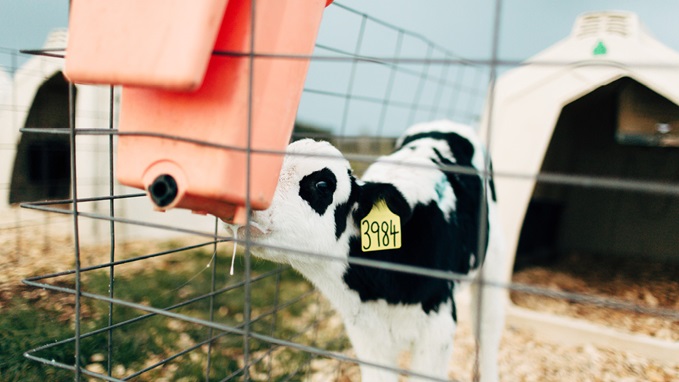
Can you overfeed a bottle calf?
All calves are cute, but there is something special about bottle-fed calves. You’ll be hard-pressed to find any animal as gentle, enthusiastic, and loving as a calf raised by hand. But before you rush out to find your new bottle-fed buddy, it’s important to understand more about their feeding habits.
Bottle-fed calves are notorious for their voracious appetites, seeming instability, and penchant for begging. Looking at that skinny, pitiful little calf in your pen, it’s hard not to want to give them all they can eat!
However, doing so can be dangerous. It may be hard to believe, but overfeeding bottle-fed calves can happen quite easily and the results can be deadly. If you’re preparing to bottle feed a calf, this article will help you understand more about overfeeding, why it’s dangerous, and how you can avoid it.
How does overfeeding happen?
Like some other animals, calves don’t know to stop eating when their stomach is full. This means that they’ll literally eat themselves sick – or worse – so it’s up to you to help them get the proper amount of nutrients every day.
We know that this can be difficult, especially for first-time bottle feeders. It feels monstrous to deny food to such a hungry-looking animal, but it’s important to remember that calves don’t need as much food as they think they do.
The dangers of overfeeding a bottle calf
Overfeeding a calf can obviously have a detrimental effect on your wallet, but it can also be dangerous and even deadly for the calf.
Bacterial disruption
Calf stomachs contain helpful bacteria that assist in breaking down food. Unfortunately, when these bacteria are exposed to an influx of nutrients – which often occurs when a calf is overfed – they can multiply too quickly and cause disease and other problems.
Scours
One of the deadliest afflictions that can occur when bottle feeding a baby calf scours. Scours are a form of potentially deadly diarrhea that causes a rapid loss of water and electrolytes, leading to dehydration, high temperatures, pneumonia, and eventually death. Fortunately, scours remedies are readily available for cases that aren’t too advanced.
Weaning issues
Overfeeding a bottle-fed calf can also interfere with weaning. If a calf is too dependent on bottle-feeding, it will be less likely to begin eating solid foods and may experience mineral deficiencies as a result.
How often should you bottle feed a calf?
Unlike newborn humans, young calves only need roughly two to three bottles of two liters a day or about four to six liters in total throughout the day. The exact amount will vary depending on your calf’s age and weight.
When bottle-feeding a baby calf, it is important to stick to a schedule. You can always learn more about bottle feeding schedules from your local veterinarian, milk replacement provider, or by visiting our handy bottle feeding basics page.
Keep your calf safe: bottle feeding calf tips
If you’re new to bottle feeding baby calves, keep these bottle-feeding calf tips in mind to make the process less stressful:
- Always follow the instructions on the milk replacer package.
- When in doubt, reach out to a trusted veterinarian or another knowledgeable professional to inquire about your calf’s diet.
- Don’t offer one large meal – instead, break meals up into smaller, more frequent portions.
- Remember that the first meal your newborn calf should have is colostrum, either fresh or frozen. Offer this within the first 24 hours for maximum effect.
- Ensure that all feeding materials (bottles, nipples, mixing containers) are cleaned and sanitised before the feeding process begins.
- Don’t choose the cheapest milk replacer unless you’re satisfied with its quality. Be sure to only use high-quality formulas such as ProvioCo Rural to give your calf a good start in life.
Above all, be sure to have fun! Bottle feeding a baby calf should be a wonderful experience for both you and the calf. As long as you follow our tips, don’t overfeed, and periodically check your calf for potential problems, your calf will grow up to be healthy, happy, and strong.
